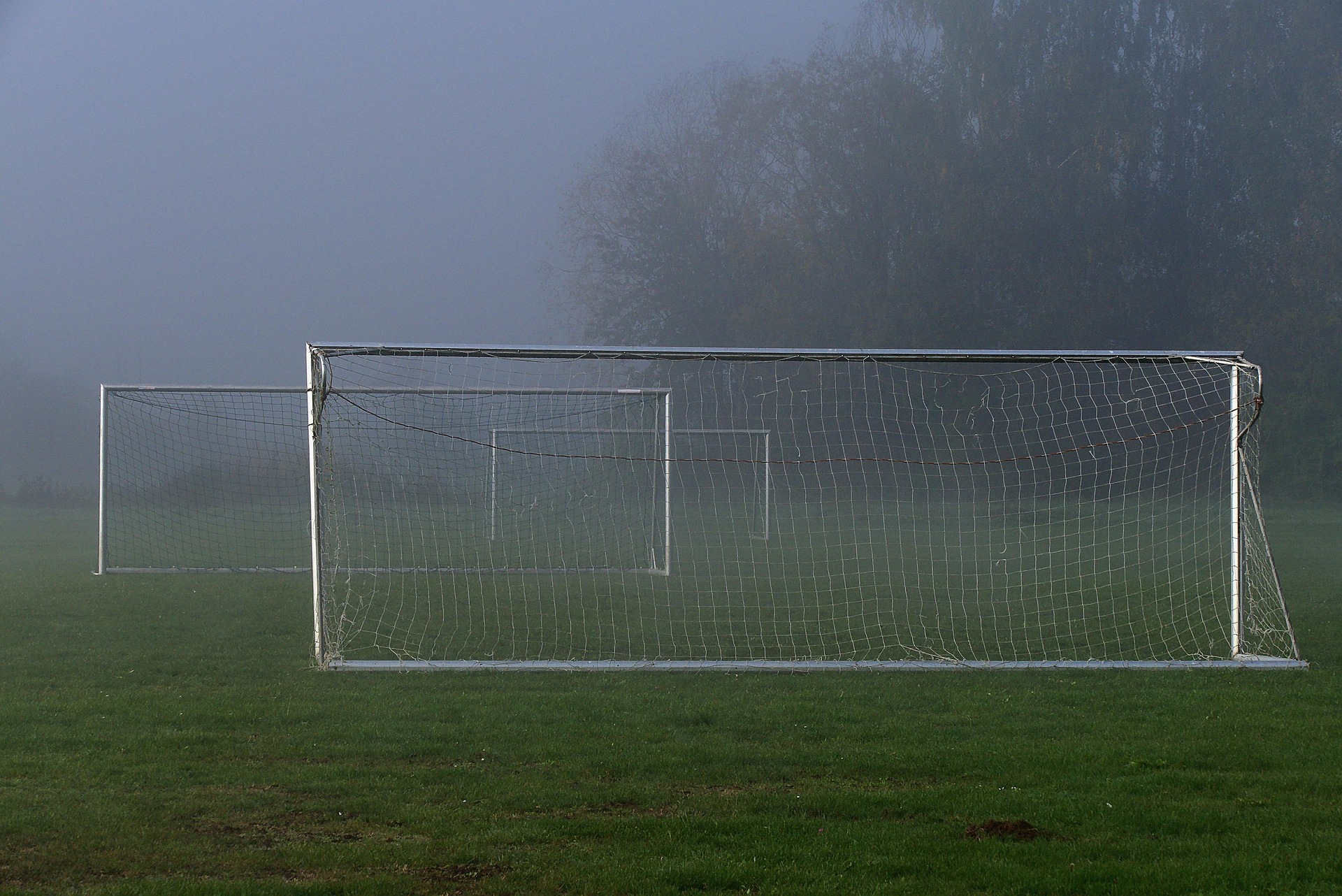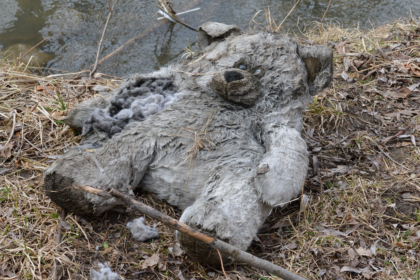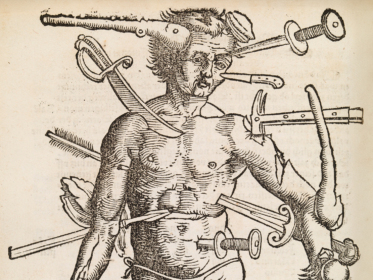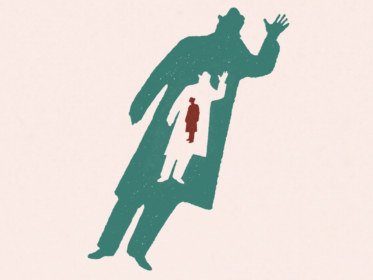I Once Had a Home
Translated by the Editors

What does it say about Germany when its comedians are now writing books about fascism? In FASCHOLAND, Canberk Köktürk, a former writer on the popular late night satire show ZDF Magazin Royale, embarks on a journey through Germany to investigate the legacy of right-wing extremism and the conditions that have given rise to its comeback. Born to a family of Turkish Gastarbeiter (or, “guest workers”) in the Ruhr, Köktürk makes the case that fascism has always been a reality for “foreigners” and for people with migrant backgrounds like himself. He methodically gathers evidence in the manner of a private detective, speaking with filmmakers, influencers, family members, cab drivers, and activists, presenting his findings as case files. On the occasion of the book’s German publication, we are releasing a translated excerpt, featuring a visit to Köktürk’s hometown and a conversation with his parents.
— the Editors
ON THE WAY to my parents’ house, I made a small detour. I drove to the old sports field where I played football every day with my friends as a child. We used to live right across the street and I knew the route by heart. I stopped at the big parking lot that served the sports field, a primary school, a kindergarten, and a Protestant church. The church had fascinated me. It wasn’t one of those typical brick buildings with a tower. It was more of a modern structure, a horizontal triangle, and from today’s perspective, it looked more like the compound of a cult. Later on, I was told that Protestant churches often looked like that. I remembered attending a few services there when I was in the kindergarten next door. “He’s got the whole world in His hands,” we sang, and I wondered, who does? Whose hands are that big?
I walked past the church and a little further to the entrance to the sports field. I turned around and looked up. There it was, our small apartment in the huge residential building. I counted five stories and twenty flats. My memories were faint, but our apartment must have been on the fourth floor. From the hallway window, we could see the football pitch. The kitchen faced the courtyard, where several birch trees towered high above us. When I was little, I used to watch them dance in the summer breeze. Those were perhaps the most peaceful moments of my entire life.
Since right-wing populism and extremism had reconnected with their historical roots and made a comeback, I had lost touch with my childhood. I had forgotten what it felt like to simply exist. The soft, innocent feelings of curiosity, of discovering new things, no matter how small — all that felt like it had happened centuries ago. I’d even lost the ability to let those feelings in, caring only about the here and now. All I could think about were Nazis and Germany. I had one reason to exist: to make it clear to the Germans that they weren’t innocent in the mess we were now in. Because no one took responsibility for the rise in racism and hate in this country. No one felt responsible for the role of the political players or the media who used all of this for their own agenda. No one took responsibility for their own mistakes. Everyone just pointed fingers at each other. And I wanted to change that. I had to show them that no one was innocent.
Germany had made me numb. All I wanted was for people in this country to understand why I felt the way I did. That’s why I started this investigation into “Fascholand.”
In recent years, I’d done nothing but think about “FASCHOLAND” — and in the process, lost touch with myself. For a long time, I hadn’t known who I was. Germany had forced me to deal with things I wanted to ignore. I pushed away everything that made me an independent person, just to survive this state of affairs. For half my life, Germany had dragged me through hell.
I walked onto the field and sat down on the stone bleachers. Six children were running across the artificial turf, shouting the players’ names, cheering every goal like it was the most important thing in the world. That’s exactly what we used to do. “Asamoah!” I would shout, wearing the green Schalke away jersey from 1999 with “Olaf Thon” on the back — my youth team had given it to me for my ninth birthday. I looked over at the elementary school and remembered how we used to trade Pokémon cards. That rush I got as a kid, it was like the amphetamines I experimented with in my early twenties. Even now, whenever I see Pokémon cards at the newsstand, I get excited and buy a pack. I remembered the first games I played on my Gameboy. I remembered the older kids in bomber jackets always pushing me into the bushes on my way home. I remembered the overwhelming nervousness before a match, especially when the girls from school showed up to watch us. I remembered the 16-year-old bully threatening us with a shiny, brand-new butterfly knife, because he and his boys wanted to play on the field. I remembered my first cigarette, the first time someone punched me in the face, my first day at university. All of it had happened right here. And I had forgotten it caught up in my fight against Germany. I had forgotten that I once had a home. I had forgotten love. I had forgotten tenderness. Germany had made me forget.
Germany had given me nothing but sadness and fear. It had stripped me of my capacity for surprise. Germany had made sure that nothing could excite me anymore, whether in a good or a bad way. Germany had made me numb. All I wanted was for people in this country to understand why I felt the way I did. That’s why I started this investigation into “Fascholand.” So that no one here would ever have to feel like this again. Never again.
And all because my grandparents decided to leave their village and come to Germany, full of hope. Or hope at least to earn enough money to build something of their own back home.
Guest workers were brought in for jobs the Germans didn’t want to do. Hard and dirty labor, such as mining. After the deal was signed, recruitment offices opened in Turkey. Men had to meet strict criteria: no older than 40, single, literate, and physically fit.
The history of Gastarbeiter (“guest workers”), the largest migration movement into Germany, is one of the least discussed chapters in this country’s history. Yet it continues to shape how migrants are seen today: as economic units, not part of the larger population. Whether “the foreigner” was accused of stealing jobs or of taking benefits (because the state wouldn’t give him a work permit), they were reduced to financial objects, much like today’s asylum seekers. Cogs in the capitalist machine. Today, the same attitudes and the “xenophobia” of the guest worker era are playing out again. But no one wants to see it. No one cares about the history of guest workers. Not in school, not in culture, not on television.
When the first labor recruitment deal with Italy was signed, Hitler had only been dead for ten years. Many Nazis were still alive when Germany began to bring in foreign workers. Some still held office. That part of history continues to be ignored today. We are still at the stage of drawing lines between “good” and “bad” foreigners. Even Friedrich Merz thanked the so-called “good ones” during one of the many televised election debates this year, making a distinction between “good” and “bad” foreigners and highlight those who, in the eyes of the Germans, had successfully integrated after three generations.
Even the Green Party progressive Robert Habeck spoke during his election campaign about “good” refugees who worked and “bad” ones who didn’t. This framing, of value only through labor, takes us right back to the guest workers.
The history of Turkish guest workers began with the labor agreement between Germany and Turkey from October 30, 1961. At the time, Germany needed workers during its Wirtschaftswunder, the economic miracle. Guest workers were brought in for jobs the Germans didn’t want to do. Hard and dirty labor, such as mining. After the deal was signed, recruitment offices opened in Turkey. Men had to meet strict criteria: no older than 40, single, literate, and physically fit. Looking at the old photos now, it’s hard not to feel a deep unease. People lined up, examined closely, like livestock at a cattle market.
In the German narrative, someone else was always to blame. Crime? The ghettos. Unemployment? The ghettos. Poor education? The ghettos. It was our fault for not embracing their “superior” culture. But the truth was the opposite.
Once in Germany, the conditions were harsh. Many lived in cramped, inhumane spaces, often directly on the factory grounds. By design, they were excluded from social life in Germany. On top of the hard work came financial fears and existential worries. This took a toll. After the end of recruitment 1973, family reunification began. Many families moved into homes of their own, though discrimination on the housing market made it difficult. So neighborhoods with high migrant populations formed, often labeled as “ghettos.” Ours was one of them. Well into the early 2000s, two generations had lived there without feeling the need to speak German. Everyone managed in their mother tongue. Even the Greeks and Italians picked up some Turkish, and vice versa. It was only paperwork at city hall thatwas entrusted to the second generation, or our generation. This way of life, especially among Turkish, Kurdish, and Arab families, was criticized. Even though racism and structural discrimination — in schools, housing, and the labor market — excluded us, Germans gaslighted us and flipped the script: “The foreigners should have tried harder to fit into society.” In the German narrative, someone else was always to blame. Crime? The ghettos. Unemployment? The ghettos. Poor education? The ghettos. It was our fault for not embracing their “superior” culture. But the truth was the opposite. When you grow up in a country that excludes you, that offers no prospects, that talks about you but never with you, you get backed into a corner. It was hard to form an identity. Some of my childhood friends found theirs in religion. Others, later, found it in nationalism. I developed a weird kind of local patriotism through football. For a time, my entire identity was formed around Schalke 04. Just Schalke and football. I was a small, dumb, but typical boy.
These days, asylum seekers are under even more pressure. They have become national talking points, all the while haunted by their traumatic pasts, brutal presents, and uncertain futures. They are easy prey for extremists who want only one thing: to plunge society into chaos and take control.
It took me less than five minutes to drive from the old sports field to the street where my parents lived today. My father opened the door and quickly returned to the living room, where he was watching a football match. “Come in,” he said. I hugged him and my mother, and realized how much I had missed them both. The VfL Bochum game was blaring on the TV. My mother immediately placed food and drink down in front of me.
“Hey, can I ask you something?”
“Of course, kuzum,”1 my mother said.
“Do you remember your first day in Germany?”
They both paused for a moment.
“From the airplane, everything looked so tidy. I thought Europe would be more beautiful, more advanced than Turkey. At Düsseldorf airport, there was a special bus that took me to Bochum. Everything seemed so modern. But when I arrived at your grandfather’s flat, I was shocked. Forty-five square meters for six people. One toilet for the entire floor, which three families had to share,” my mother recalled.
“I came by car with your grandparents,” my father said. “Back then, there was a designated transit route through Bulgaria that you were forbidden to stray from. Then we went through Yugoslavia and Austria. You could already tell things were different. It was neater than back home. But like your mother said: three flats on one floor, none of them with their own toilet. And twelve families in a tiny house. One shared bathroom.”
“That was shit,” my mother said slowly and quietly, clearly caught in the memory.
My father yelled at VfL Bochum missing a simple tap in. Aside from his one true love, Beşiktaş Istanbul, he also had a soft spot for Bochum and Schalke. No one in our family liked Dortmund.
“Avrupa anlatıldığı gibi değildi, be!”2 My mother screwed up her face and waved her hand dismissively.
“When you come from Turkey, where we had a house and a garden, you think things will be even better in Germany. But it was a culture shock. Those were factory-owned buildings, made just for workers. And there were no showers. They figured the guest workers would wash at the plant,” my father said, absentmindedly watching the screen.
“When did you move into the black house?” I asked my mother. In my memories, my grandparents had a toilet inside a black apartment, and didn’t have to use a communal one in the hallway.
“That was the same building from the beginning. Your grandfather eventually built a toilet inside the flat.”
“Later, the workers were given the chance to buy the factory housing for cheap. Your grandfather did that,” my father added. “I got lucky, since our first apartment looked out over the Ruhr river. That reminded me of home. I grew up near the Filyos river. That was my only comfort. And your grandfather bought me a tracksuit, and I played football with the neighbor’s kid on the meadow by the river. Just like back home by the Black Sea,” he remembered.
“I really thought Europe would be different,” my mother said, still stuck in her dreams.
“What were you expecting?” I asked.
“Well, at the very least, I thought the bathroom wouldn’t be outside,” she laughed.
“We actually had to heat the water in the stove with firewood and wash ourselves that way. No different from central Anatolia,” she said.
My father was getting worked up again over the match.
“When you came to Germany, did you think it would be your new home, or did you plan on going back someday? You were teenagers, maybe in your early twenties.”
“I wanted to go back. My father wanted me to study in Germany. I really just wanted to play football in Turkey. I had real talent. After graduating from university, I planned to return. Then your mother arrived, at the end of 1981. I had been here since late 1975. At some point, we got married.”
“Family reunification began in 1973,” I added. They both shrugged.
“I also always wanted to study, but unfortunately they didn’t recognize my high school diploma,” said my mother.
“You had to attend a special preparatory college to have it recognized,” my father explained. “But your mother had to earn money for her family. So she couldn’t go.”
“No one ever told me that was even an option,” my mother said, her voice rising. You could see the suppressed anger in her face.
I tried to calm her down and quickly asked, “Dad wanted to go back. What about you?”
“When I came here, I thought: this is a foreign country — of course we’ll go back someday. But kala kaldık,”3 my mother said with a bitter laugh. “Then you kids came. But deep down, I always thought I’d return someday.”
“Do you still feel that way?” I asked.
My mother made a tsk sound with her tongue — the Turkish way of saying no.
“It’s over now,” my father mumbled, arms crossed behind his head, eyes on the screen.
“Be honest for a second. In your heart. Do you want to go back?”
“Germany is my home now. I don’t even like Turkey anymore.”
“Baba? What about you?”
“I don’t think I could live there anymore.”
“This has become our second home,” my mother said.
“First or second? If this is your home, then it’s your first home.”
“The first, the motherland, is there. This is the second.”
“But…”
“Just write ‘home.’ Who cares if it’s first or second.”
“We’ll die here,” my father mumbled.
“Most likely,” my mother sighed.
“Are you afraid for the future if the far-right comes to power?”
Bochum had won, so my father finally turned away from the TV and was more focused than before. We began to argue about whether the far-right could ever actually take back power. My father was certain it could never happen. Not despite, but in spite of the latest election results and the political mood. My mother saw it differently. “I have some doubts, my son. I am a little scared. Ağzımıza sıçarlar!”4 she laughed bitterly.


